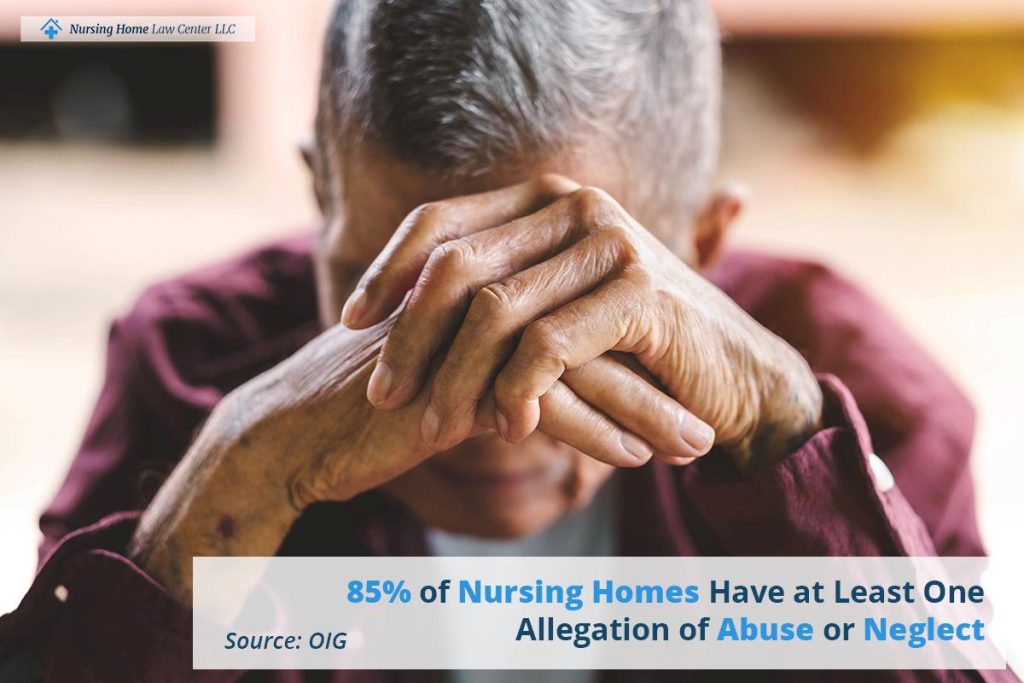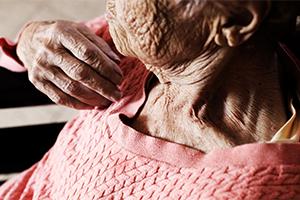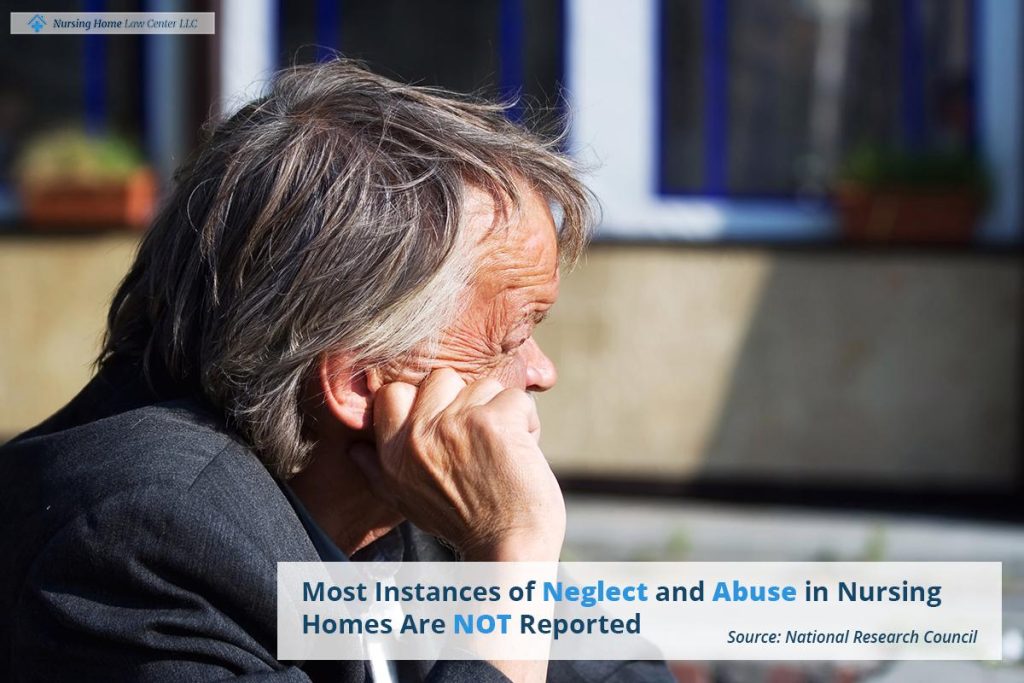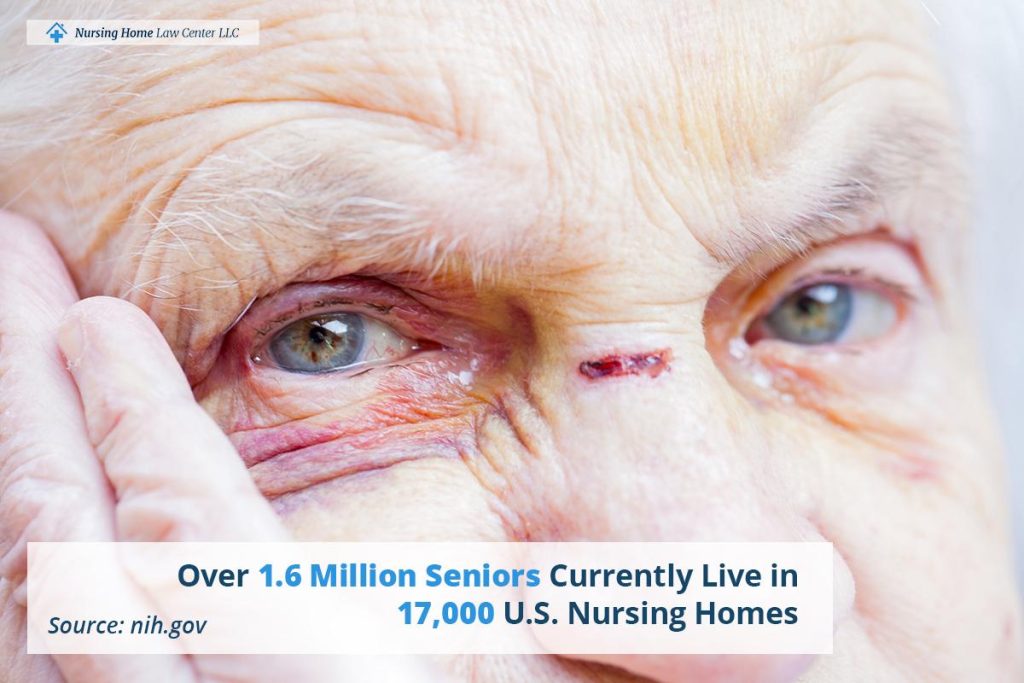The Nursing Home Law Center is committed to providing the legal resources necessary to hold negligent facilities accountable.
Nursing Home Abuse Lawyer
Experienced Law Firm Recovering Compensation in Nursing Home Abuse Cases
Nursing home abuse is a grave and often hidden issue affecting countless elderly residents in care facilities across the nation. Despite being entrusted with the care of our loved ones, some residential homes fail to meet basic standards of care, leading to abuse that has devastating consequences.
Relatives and loved ones must speak up if they notice danger signs, like unexplained injuries, changes in behavior, or poor living conditions. If you suspect maltreatment, take action with an experienced nursing home abuse lawyer as soon as possible.
The Nursing Home Law Center works with clients all across the U.S., with licensed nursing home abuse attorneys near you, ready to help. Wherever you are, we’re here to support you and make sure victims get the care and justice they deserve. By working with reputable nursing home abuse lawyers, you can ensure your loved one’s rights are protected.
Nursing Home Abuse Settlements Recovered by Our Law Firm
Settlements in nursing home abuse cases can vary depending on the situation. Here are some notable settlements our experienced nursing home abuse lawyers have recovered for residents:
- $1,500,000 Settlement – Secured for a group home resident who was physically abused by other residents, leading to serious harm.
- $1,250,000 Settlement – Reached after a woman tragically choked, with the case settled before litigation.
- $1,200,000 Settlement – Awarded for a disabled woman who was injured in a nursing home van accident.
- $1,700,000 Settlement – Recovered for a nursing home resident who suffered a subdural hematoma and hip fracture after inadequate fall prevention measures.
- $1,500,000 Settlement – Secured for the family members of a dementia patient who ingested poison after gaining access to chemicals in an unlocked storage closet.
These cases demonstrate the impact of abuse in nursing homes and the importance of an experienced nursing home abuse lawyer holding negligent nursing home facilities accountable. If you suspect nursing home abuse and neglect, act quickly to get the legal support you deserve.

What Is a Nursing Home Abuse Lawyer?
A nursing home abuse lawyer is a legal professional specializing in representing elderly residents and their families in cases involving neglect within a long-term care home.
Nursing home abuse attorneys possess expertise in elder law and personal injury law. Each experienced nursing home abuse lawyer works diligently to hold negligent care facilities accountable, secure financial compensation, and ensure that the rights of elderly individuals are protected.

Why Hire the Nursing Home Law Center
At the Nursing Home Law Center, our experienced nursing home abuse lawyers are dedicated to obtaining justice and compensation for victims of elder abuse in nursing homes. Our skilled nursing home abuse lawyers have a history of managing abuse cases with care and achieving substantial settlements.

What Is Considered Nursing Home Abuse?
Nursing home abuse is the mistreatment or neglect of residents in nursing homes and assisted living facilities, resulting in physical harm and emotional trauma.
Our experienced team of nursing home abuse lawyers is equipped to handle a wide range of abuse and neglect cases, ensuring victims receive the compensation they deserve.
Physical Abuse
Physical abuse in nursing homes involves intentional harm or injury to residents. This can include hitting, slapping, or inappropriate use of restraints. Such abuse can lead to severe physical injuries and chronic pain, including broken bones, bruises, or even more serious harm.
In these cases, elder abuse attorneys conduct thorough investigations to hold the responsible parties accountable and secure compensation for the victims of residential home abuse and neglect.
Mental and Emotional Abuse
Mental and emotional mistreatment involves inflicting psychological harm on seniors in a nursing home through verbal abuse, threats, humiliation, or isolation. An experienced nursing home abuse lawyer knows that mental abuse leads to emotional distress, anxiety, and depression in victims.
We work diligently to uncover evidence of psychological harm, ensuring perpetrators are brought to justice.
Sexual Abuse
Sexual assault in nursing homes is a heinous violation of a resident’s dignity and rights, involving any unwanted sexual contact or behavior. We handle these sensitive cases with the utmost care, working to protect the victims’ rights and secure compensation for their trauma.
Medical Malpractice
Medical malpractice occurs when residents receive substandard care, resulting in harm or injury. Common examples include bedsores, medication errors, and failure to provide necessary medical treatment.
We are experienced in handling complex clinical misconduct cases, holding negligent nursing home staff members and facilities accountable.
Nursing Home Neglect
Nursing home negligence refers to the failure to provide adequate care and meet residents’ basic needs. This can result in poor hygiene, malnutrition, dehydration, or even elopement. Our nursing home negligence lawyers are skilled in identifying signs of negligence and pursuing legal action to protect the victim’s rights.
Financial Abuse
Financial misconduct involves the illegal use of a nursing home resident’s financial resources. Elder abuse lawyers work to uncover and address elder financial exploitation, ensuring victims receive restitution and those responsible are held accountable.
Wrongful Death
Wrongful death cases arise when an assisted living facility resident dies due to nursing home abuse. Our experienced nursing home abuse attorneys rigorously pursue these claims to secure financial compensation for the victims’ families.

What Are Nursing Home Patients’ Legal Rights?
Senior citizens are protected under federal and state laws designed to ensure their safety, dignity, and quality of life.
These legal protections aim to prevent nursing home mistreatment and provide a framework for holding nursing facilities accountable. Understanding these rights is crucial to take legal action in nursing home abuse cases.
If you have any questions, contact a nursing home abuse lawyer as soon as possible.
Federal Protection Under the Nursing Home Reform Act of 1987
One of the most significant federal laws protecting elderly residents is the FNHRA of 1987. If you suspect a failure to comply with the Act, contact an experienced nursing home abuse lawyer immediately.
The Act outlines several fundamental rights, including:
- Right to Dignity: Treated with respect by staff members and given a choice in care
- Right to Privacy: Personal and medical matters kept confidential
- Right to Safety: Protection from abuse, neglect, and exploitation
- Right to Informed Care: Participation in medical decisions
- Right to Voice Concerns: Ability to file complaints without retaliation
Several federal laws complement the FNHRA by offering broader safeguards for individuals in long-term care facilities, including:
- The Civil Rights of Institutionalized Persons Act (CRIPA) authorizes the U.S. Department of Justice to investigate and take action against residential homes with abusive or neglectful conditions.
- The Older Americans Act (OAA) funds programs to protect older adults, including those in nursing homes, from abuse and to provide services that help prevent mistreatment.
- The Americans with Disabilities Act (ADA) protects residents with disabilities from discrimination in care homes and ensures that they receive the necessary accommodations and care.
- The Family and Medical Leave Act (FMLA) provides relatives with job-protected leave to care for a loved one who is experiencing abuse or neglect in a residential home.
- The Health Insurance Portability and Accountability Act (HIPAA) safeguards the privacy and confidentiality of long-term care residents’ medical information, which may be important in identifying or addressing abuse.
State Laws and Additional Protections
As your nursing home abuse lawyer will explain, state laws also provide protections for care facility occupants. These laws generally include regulations regarding staffing levels, facility licensing, and procedures for investigating mistreatment.
State laws may offer additional protections beyond federal law, reinforcing residents’ rights and establishing penalties for violations. Sometimes, navigating state laws around abuse and neglect can be complex, so having an experienced nursing home abuse lawyer on your side is vital.
Outside of the U.S., the World Health Organization (WHO) protects against elder abuse globally. The World Health Organization’s policies advocate for the improvement of long-term care facilities and the prevention of abuse in elderly populations. While recommendations from the World Health Organization are not binding in the U.S., precedents can be helpful in bringing abuse and neglect cases to trial.
Consulting with a nursing home abuse lawyer can help you navigate different regulations and understand if you have a case.
Who Can File a Nursing Home Abuse Claim?
When nursing home abuse or neglect occurs, several parties may have the legal right to file a personal injury claim.
- The elderly person can seek compensation if they are capable.
- Family members may act on their behalf if the resident is incapacitated or has passed away.
- Legal guardians or court-appointed representatives can also file claims for those unable to act for themselves.
By understanding these legal options in cases involving nursing home injuries, families can take action to secure justice and hold negligent facilities accountable. A knowledgeable nursing home abuse lawyer can guide families through the legal process.
How Our Nursing Home Abuse Attorneys Can Help
At the Nursing Home Law Center, our dedicated nursing home abuse lawyers understand the complexities of abuse and neglect cases.
With a long history of success in cases of abuse and neglect, we provide comprehensive legal services to guide you through every step of the process, from your initial free consultation to resolution.
Free Case Evaluation
We offer a free case evaluation to discuss the details of your situation and assess the viability of your nursing home abuse lawsuit.
In this consultation, our nursing home abuse attorneys will listen to your concerns, answer any questions, and honestly assess your legal avenues. This no-obligation meeting allows you to understand the potential of your case and decide on the best course of action moving forward.
Case Investigation
A thorough investigation is crucial to building strong nursing home abuse cases. Our nursing home abuse attorneys will gather all necessary evidence, including medical records, witness statements, and facility inspection reports, to establish the facts of the case.
Then, we work closely with experts, such as medical professionals and forensic specialists, to identify instances of abuse or neglect and determine the extent of the harm caused.
Filing the Claim
Once the investigation is complete, our nursing home abuse attorneys will file the appropriate legal claims against the nursing facility and any other responsible parties.
We will ensure all necessary documentation is prepared accurately and filed promptly, adhering to any relevant deadlines, so you can focus on supporting your loved one.
Settlement Negotiation
During settlement, your nursing home abuse lawyer will negotiate aggressively to secure a settlement that compensates for the abuse suffered, including coverage for emotional and physical harm, as well as financial harm by staff members.
Our nursing home abuse lawyers are skilled negotiators who understand the tactics used by insurance companies and are prepared to counter them effectively to maximize your settlement.
Trial if Needed
While many nursing home abuse cases are resolved through settlement, some may require litigation. If a fair settlement cannot be reached, our nursing home abuse attorneys are fully prepared to take your case to trial.
With extensive courtroom experience, your nursing home abuse lawyer will present a compelling case before a judge and jury, advocating for your rights and the justice your loved one deserves.

What Are Common Signs of Abuse in Nursing Homes and Assisted Living Facilities ?
Abuse can take many forms, and the signs may not always be immediately apparent. Being vigilant and attentive to changes in a resident’s physical, emotional, and financial well-being is essential for identifying potential abuses in a nursing home facility.
Here are some common signs to watch for:
- Unexplained Injuries: Bruises, cuts, burns, or fractures
- Restraint Marks: Bruising on wrists or ankles
- Emotional Distress: Anxiety, depression, withdrawal
- Fear of Caregivers: Apprehension around staff
- Behavioral Changes: Mood swings, agitation, personality shifts
- Bruising Around Genitals: Unexplained injuries in sensitive areas
- Bedsores: Pressure sores from neglect
- Medication Errors: Sudden health complications from incorrect doses
- Poor Hygiene: Dirty clothing, unwashed hair, strong odor
- Malnutrition & Dehydration: Weight loss, dry skin, dehydration
- Unsafe Living Conditions: Cluttered, unsanitary rooms
- Elopement: Residents wandering off unnoticed
- Financial Exploitation: Unexplained withdrawals, missing belongings
- Unattended Medical Treatment: Delayed response to severe health issues
- Wrongful Death: Unexpected passing in suspicious circumstances
Loved ones must remain vigilant and contact an expert nursing home abuse lawyer if they are suspicious.

What to Do If You Suspect Abuse in a Care Facility
If you suspect a loved one is experiencing nursing home abuse, take immediate action.
- Call 911 if Immediate Danger Exists: If your loved one is in immediate danger or has suffered serious injuries, contact emergency services immediately.
- Report to the Care Facility Administrator or Management: Notify the residential home administrator or management about warning signs shown by staff members. Make sure to document all communications, including dates, times, and responses.
- File a Complaint with Your Local Ombudsman’s Office: The Ombudsman program advocates for the rights of nursing home residents and can investigate complaints of abuse or neglect. Filing a complaint with the Ombudsman’s office can also initiate an official investigation into the facility’s practices.
- Report to the Centers for Medicare & Medicaid Services (CMS): CMS oversees residential homes and can intervene if a facility is not complying with federal standards. File complaints directly through their Complaint Page.
- File a Complaint with the U.S. Department of Justice (DOJ): The DOJ enforces civil rights protections for residents and can investigate abuse claims. To learn more, visit their Civil Rights Division page.
- National Adult Protective Services Association (NAPSA): NAPSA is a resource for those seeking help with senior abuse, including nursing home abuse. They can connect you with your state’s Adult Protective Services (APS) agency, which investigates senior abuse complaints. Visit NAPSA’s website for more information.
- Contact a Nursing Home Abuse Lawyer: Contact an experienced nursing home abuse lawyer to discuss your concerns, your legal options, and to begin the legal process. Experienced nursing home abuse attorneys can help you understand your rights, gather evidence, and pursue a claim against the responsible parties.
Get a free consultation with a nursing home attorney to see what laws may apply to your situation.
What Damages Can Be Recovered Through a Nursing Home Abuse Claim?
When pursuing a nursing home abuse claim, victims and their families may be entitled to recover various types of damages with the help of a nursing home abuse lawyer and their legal team.
In nursing home abuse cases, compensation can be categorized into economic and non-economic damages:
Economic Damages
Economic damages are quantifiable financial losses incurred due to nursing home abuse. Your nursing home abuse lawyer will help you gather the evidence of these damages to support your case.
Examples include:
Medical Expenses
Medical costs related to treatment resulting from nursing home abuse, such as hospital bills, medication, rehabilitation, and ongoing medical care.
Relocation Costs
Expenses incurred when moving a resident to a safer facility or living arrangement.
Therapy and Counseling
Costs associated with psychological treatment and counseling for psychological distress experienced by the victim.
Lost Wages
Compensation for lost income if the victim or their relatives had to take time off work to address the abuse or neglect and to care for the victim.
Legal Fees
Expenses related to the legal process, including your nursing home abuse lawyer’s fees (which are recovered from the other side so you don’t pay out of pocket) and court costs.
Non-Economic Damages
Non-economic damages are subjective and compensate for the intangible effects of nursing home abuse and neglect. An experienced nursing home abuse lawyer will help argue your case for these kinds of damages.
Examples include:
Pain and Suffering
Compensation for physical pain and discomfort due to the abuse.
Emotional Distress
Damages for the psychological impact of the abuse, such as anxiety, depression, and loss of enjoyment of life.
Loss of Dignity and Independence
Compensation for the humiliation and loss of autonomy experienced by the victim.
Loss of Companionship
Damages awarded to next of kin for the loss of companionship if the abuse led to the victim’s wrongful death or severe injury.
In some cases, punitive damages may also be awarded. These are intended to punish the wrongdoers and deter similar behavior in the future, particularly when the abuse was egregious or intentional. In these heinous cases, an experienced nursing home abuse lawyer will fight for punitive damages.
At the Nursing Home Law Center, our elder abuse attorneys are committed to securing the compensation your loved one deserves for their suffering as a result of residential home abuse and neglect.
How Much Can Be Recovered Through a Nursing Home Lawsuit?
According to Law.com’s VerdictSearch, payouts in nursing home abuse and neglect cases range from $50,000 to $250,205,000. The average payout is $10,668,636, while the median recovery is $1,302,375.
Several factors can influence the value of a claim, including:
- Type and severity of neglect or abuse (e.g., physical abuse, malnutrition, untreated bed sores, falls)
- Extent of physical injuries and medical bills due to the abuse
- Resident’s age, overall health, and life expectancy at the time of the incident
- Evidence of understaffing, poor training, or systemic neglect at the facility
- Quality and timing of medical intervention once harm was discovered
- Documentation of resident care plans, safety protocols, and whether they were followed
- Emotional trauma and loss of dignity suffered by the resident
- Family testimony about the impact of the abuse or neglect
- Availability of punitive damages for reckless or intentional misconduct
Example Cases
$250,205,000 – Malnutrition, Neglect, and Falsified Records
Bryan Sellers, 80, entered a nursing home after a stroke and died from a lung infection and alleged malnutrition. His daughter claimed he was neglected, left without feeding assistance, and that records were falsified to show he was eating.
Hospice records showed weight loss and refusal of meals. Photos revealed severe neglect and malnourishment. The defense argued emphysema caused his death, but the jury found gross negligence and awarded $30,000 in actual damages, $250,000,000 in punitive damages, and $175,000 in attorney fees.
$200,000,000 – Fatal Fall, Abuse, and Systemic Neglect
Elvira Nunziata, 92, died after falling down a stairwell while strapped into her wheelchair. Her son alleged years of systemic neglect, including malnutrition, dehydration, infections, and poor supervision, despite knowing she had dementia and was prone to wandering. Experts testified that profit was prioritized over care, leading to widespread failures.
A medical expert said she lay undiscovered for nearly an hour after her fall. The jury awarded $5 million for negligence, $5 million for abuse, $140 million in punitive damages, and $50 million for loss of parental guidance.
How Much Do Nursing Home Lawyers Cost?
Our nursing home abuse attorneys understand that the financial burden of legal fees can be a concern. To ensure victims of nursing home abuse have access to experienced legal representation, your experienced nursing home abuse lawyer will offer a free consultation and our services on a contingency fee basis.
Under a contingency fee arrangement, clients do not pay any upfront fees or out-of-pocket expenses. Instead, our fees are contingent upon successfully recovering compensation through a settlement or verdict. This means you only pay if we win your case.
How Long Do Nursing Home Residents Have to Seek Legal Action?
When pursuing a nursing home abuse claim, your nursing home abuse lawyer will make you aware of the statute of limitations, which is the legal deadline for filing a lawsuit. Failing to file within this timeframe can result in losing your right to seek compensation and hold the responsible parties accountable.
The statute of limitations varies by state and the specific circumstances of each case. Typically, these time limits range from one to several years from the date the abuse occurred or was discovered.
Contacting an experienced nursing home abuse lawyer promptly is essential to ensure your claim is filed within the statute of limitations. Delaying action can result in losing crucial evidence, diminished witness recollections, and, ultimately, the forfeiture of your legal rights.
Who Can Be Held Liable for Elder Abuse in a Nursing Home Setting?
When an elderly person enters a nursing home facility, they and their family trust that staff will provide safe housing, proper medical care, and compassion. Unfortunately, abuse and neglect still occur, and when they do, multiple parties may be legally responsible. A well-prepared nursing home lawsuit can identify all liable actors and hold them accountable.
Direct Care Staff
One of the most common sources of harm comes from hands-on caregivers. A certified nursing assistant or other frontline worker may be responsible for acts of physical abuse, such as hitting, unnecessary restraints, or neglect leading to broken bones.
They may also commit emotional abuse or even sexual abuse. In cases of neglect, issues like medication errors or failure to monitor vital signs can cause serious harm. When staff are involved, both the individual and the employer may be liable.
The Nursing Home Facility Itself
The nursing home facility can also be held accountable. Administrators are responsible for hiring practices, staff training, and supervision. If they ignore warning signs of abuse, fail to provide adequate staffing levels, or lose track of crucial medical records, they may be directly or vicariously liable.
The facility must also cover damages tied to medical bills and other medical expenses resulting from harm to residents.
Third Parties and Contractors
Sometimes liability extends beyond direct employees. Outside physicians, pharmacies, or companies contracted to provide food, security, or health services may share responsibility. For example, a doctor who ignores signs of physical abuse in medical records or a pharmacist whose errors lead to serious injuries could be defendants in litigation.
Seek Justice With a Nursing Home Abuse Lawyer Near You Today!
If you suspect your loved one has suffered from nursing home abuse, take immediate action now to protect their rights and ensure their safety.
Our team of nursing home abuse attorneys is dedicated to securing justice and compensation for those who have suffered due to the negligence or misconduct of nursing facilities.
With a proven track record of achieving significant settlements and verdicts, our nursing home abuse lawyers are committed to holding responsible parties accountable and ensuring your loved one receives the care and respect they deserve.
Don’t wait to take action. Contact the Nursing Home Law Center today to speak with an experienced nursing home abuse attorney. Call us now at (800) 926-7565 or use our contact form to schedule your free case evaluation and take the first step toward holding negligent parties accountable.

